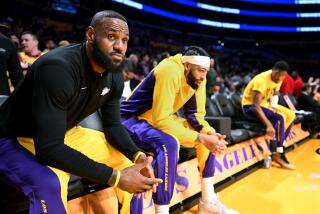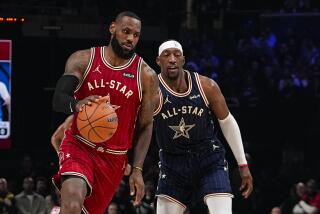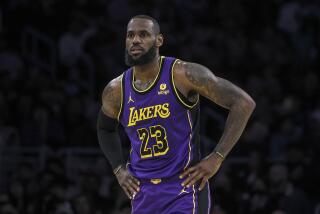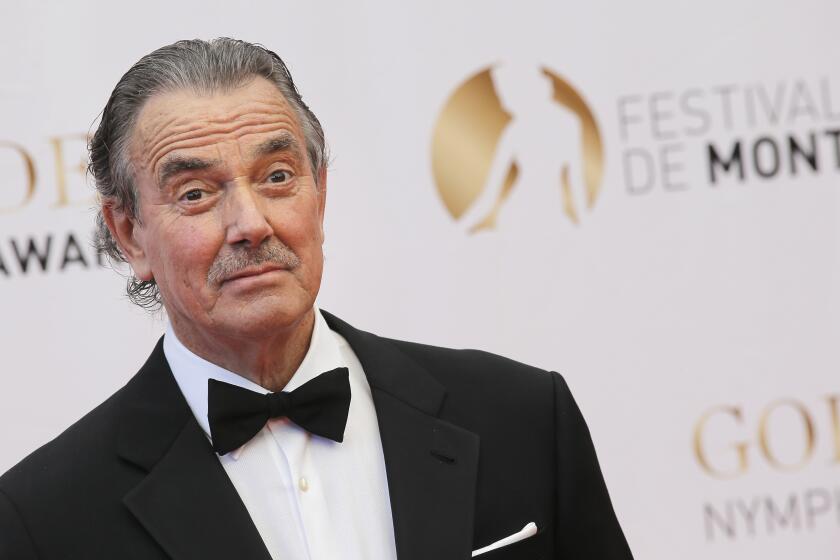Reviews: ‘Dream Team,’ ‘Igniting the Flame’ and evolving ideals
Dream Team
How Michael, Magic, Larry, Charles, and the Greatest Team of All Time Conquered the World and Changed the Game of Basketball Forever
Jack McCallum
Ballantine Books: 336pp., $28
*
Igniting the Flame
America’s First Olympic Team
Jim Reisler
Lyons Press: 285 pp., $25
LONDON — The evolution of the Olympics through the last 100-plus years can be compared to having your backyard barbecue turn into Restaurant Row in Beverly Hills. The trappings of innocence and just having good old-fashioned fun have been replaced by unrestrained jingoistic marketing and brand identification.
The true sports fan holds to the ideal that the Games are about the athletes. But they’re not. The focus is on branding that will lead to the eventual sale. It happens on all levels: Even photojournalists at the Games are lent lenses worth $5,000 and more by Canon and Nikon in the hope that their distinctive color will be picked up by television or in the background of photos. Then, someone watching the Games might think, “If the best photographers in the world use that lens, I should do the same.”
The contrast between the way the Olympics used to be and what it is now is clearly spelled out in two books published (along with a glut of other titles) just in time for the Summer Olympics in London.
Jack McCallum’s “Dream Team: How Michael, Magic, Larry, Charles, and the Greatest Team of All Time Conquered the World and Changed the Game of Basketball Forever” takes a look at the 1992 Summer Games in Barcelona and captures the personalities and egos of the greatest U.S. Olympic basketball team ever assembled.
A longtime writer for Sports Illustrated, McCallum clearly argues that the sole motivation behind the creation of the Dream Team was to sell the NBA and its stars. He walks a fine line as observer and reporter — he even admits to occasional awe at being around arguably the most famous athletes on the planet at that time. McCallum doesn’t tell every story, like most sportswriters: The line between private lives and public image is one few reporters like to cross and even fewer media outlets like to run.
He does display good insights into many of the players, however, like Magic Johnson, which helps us better understand the criticism Johnson has gotten lately for being the self-proclaimed public face of the Dodgers though he hasn’t been to many games.
“I never got the idea that [Michael] Jordanwas anyone else but Jordan,” McCallum writes. “That goes double for [Larry] Bird. Magic seemed to be a bit contrived, as if he had an on switch that he activated every time a camera was in his radar range. He came close to admitting it himself, stressing that ‘Magic and Earvin are two different people.’ ”
Many of the exploits of the first Dream Team have been told, yet McCallum does it in a way that gives readers a better understanding about the individual players and their motivations then it does about the team (although, sometimes, his basket-by-basket account gets tedious).
“Dream Team” also introduces us to some new faces, such as Yugoslavian player and coach Boris Stankovic, who was responsible for this crazy concept of using superstars on the Olympic team. McCallum’s book is a great read for basketball junkies who like to look back at the players who made the NBA more relevant than Major League Baseball (although you would get an argument from some on the two sports).
This year’s version of the Dream Team may be the last. NBA commissioner David Stern has floated a proposal to put an age-cap of 23 on the USA Olympic basketball team (Kobe Bryant called the idea “stupid”). Although Stern might just be having some fun stirring it up as he prepares to exit his job in the next few years.
It was a very different U.S. Olympic team that traveled to Athens for the 1896 Games. There’s a lot to learn from Jim Reisler’s thin but well-researched “Igniting the Flame,” which opens with the boat ride that the loosely assembled team of preppy Ivy Leaguers took across the Atlantic.
There were no tryouts for these Games. Instead it was more like Mickey Rooney had gathered up a bunch of his pals and yelled, “Hey, kids, let’s put on a show.”
Reisler’s task in researching this project is evident from 40 pages of attribution notes — and the book does have a research paper feel to it, but he manages to tell the story with a good conversational style.
Throughout, Reisler provides readers with plenty of amusing gems. Take, for example, that the American athletes thought the Games started on April 18, 1896 — in fact, they began on April 6. How did this mistake happen? The Greeks, Reisler explains, used the Julian calendar while the Americans used the Gregorian: The result was that the Americans didn’t arrive as early as they had hoped.
And, by the way, the winners didn’t receive gold medals — silver medals were awarded to winners and runner-ups received bronze (the practice of giving gold medals didn’t start until 1904). “[James] Connolly and the other Olympic victors,” Reisler writes, “would earn silver medals for these Games, not gold.… With gold coins the standard currency at the time in many nations, [Greek Crown Prince] Constantine reasoned that gold medals would make it seem that the athletes were being paid.”
Perhaps the most entertaining characters in “Igniting the Flame” are brothers Sumner and John Paine, a couple of rich kids living in Paris who were recruited because they were expert marksmen. They dominated the shooting competition while reaching into their pockets between shots to sip whiskey from a flask. (If the Paine brothers were competing today, they’d probably have an endorsement deal with Jim Beam.)
Today’s emphasis on selling brands at the Games is a far cry from what International Olympic Committee founder Baron de Coubertin envisioned when he revived the concept of the Games at the end of the 19th century. In fact, what can you say about an event so big that NBC is willing to lose $100 million for the right to own it on all platforms?
Yeah, a lot can change in 100 years.
Cherwa, deputy sports editor, is running the L.A. Times/Tribune Olympic Bureau in London. It is his seventh Olympic Games.
More to Read
The biggest entertainment stories
Get our big stories about Hollywood, film, television, music, arts, culture and more right in your inbox as soon as they publish.
You may occasionally receive promotional content from the Los Angeles Times.







